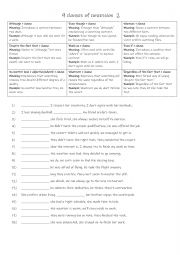
|
9 clauses of concession 2
First, students need to familiarise themselves with the 9 clauses and their meanings. Then they read the sentences to see which one is required to complete the gap-fill. Each clause is used 2 times! Answers on page 2.
Level: intermediate
Age: 10-100
Type:
Downloads: 115
|
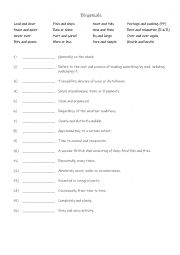
|
Binomials - common pairs of words 1a
These pairs are often used for their rhythmic and memorable qualities, making the language more engaging and easier to remember.In English grammar, binomials are expressions where two words are joined by a conjunction (usually "and" or "or") to form a fixed phrase. These word pairs often have a set order that native speakers instinctively use. Bino...
Level: intermediate
Age: 12-100
Type: worksheet
Downloads: 104
|
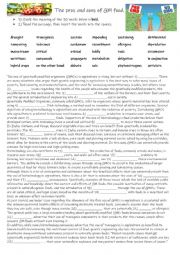
|
The pros and cons of GM food.
1300-Word reading essay with a gap fill exercise about the advantages and disadvantages of GM food. It takes an in-depth look at both sides of the argument.This sheet is suitable for higher level B1 to C1 students of all ages. An answer sheet is included. For higher level students they could be put in groups to give / present their opinions in a pr...
Level: intermediate
Age: 14-100
Type:
Downloads: 1854
|
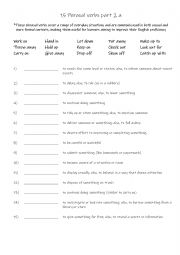
|
15 Phrasal verbs part 2 a worksheet
These phrasal verbs cover a range of everyday situations and are commonly used in both casual and more formal contexts, making them useful for learners aiming to improve their English proficiency; they are suitable for CEFR A2-B1 levels. Students match the phrasal verbs to their definitions. Answers on page 2. All of the phrasal verbs used in this ...
Level: elementary
Age: 10-100
Type:
Downloads: 125
|
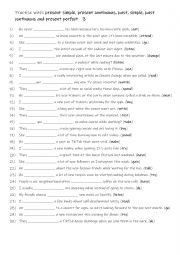
|
Practise with: present simple, present continuous, past, simple, past continuous and present perfect 3
First, students need to familiarise themselves with the 5 tenses and their use. Then they read the sentences to see which one is needed to complete the sentence using the given infinitive in (). Each tense is used 6 times! Answers on page 2.
Level: elementary
Age: 8-100
Type: worksheet
Downloads: 139
|
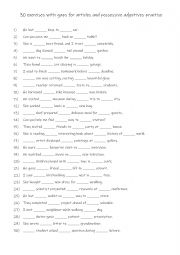
|
Articles and possessive adjectives practise
Students read the sentences and work out what article ( a, an , the) is needed and what possessive adjective is needed according to the subject. Answers on page 2
Level: elementary
Age: 8-100
Type:
Downloads: 107
|
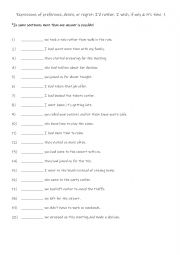
|
Expressions of preference, desire, or regret I�d rather, I wish, if only & it�s time 1
Students should learn expressions of preference, desire, or regret like "I�d rather," "I wish," "If only," and "It�s time" because they help them communicate personal feelings, make choices, and reflect on past experiences or future possibilities in English. These phrases allow students to express what they want, what they regret, or what they feel...
Level: intermediate
Age: 10-100
Type:
Downloads: 105
|
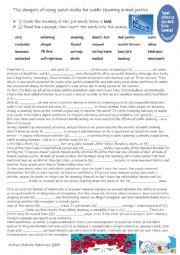
|
The dangers of using social media for public shaming & mob justice.
Reading passage with a gap fill exercise about the risks involved using social media to shame someone who (allegedly) has committed a 21st century socially unacceptable crime! This sheet is suitable for higher level B1 to C1 students of all ages. An answer sheet is included. For higher level students they could be put in groups to give / present th...
Level: intermediate
Age: 12-100
Type: worksheet
Downloads: 2157
|
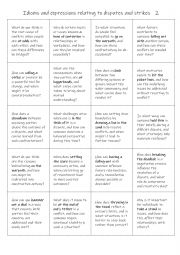
|
B1+-C1 Idioms and expressions relating to disputes and strikes 2
This is a speaking reinforcement activity to supplement the other worksheet I uploaded on 5/3/2025. Students working in pairs or small groups can either ask each other the questions or answer the question themselves.
Level: intermediate
Age: 12-100
Type:
Downloads: 107
|
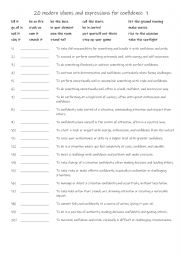
|
B1+-C1 20 modern idioms and expressions for confidence 1
First, students need to familiarise themselves with the 20 idioms and expressions and their meanings. Then they read the definitions to see which one is being described and write that word in the space provided Answers on page 2.
Level: intermediate
Age: 12-100
Type:
Downloads: 109
|












